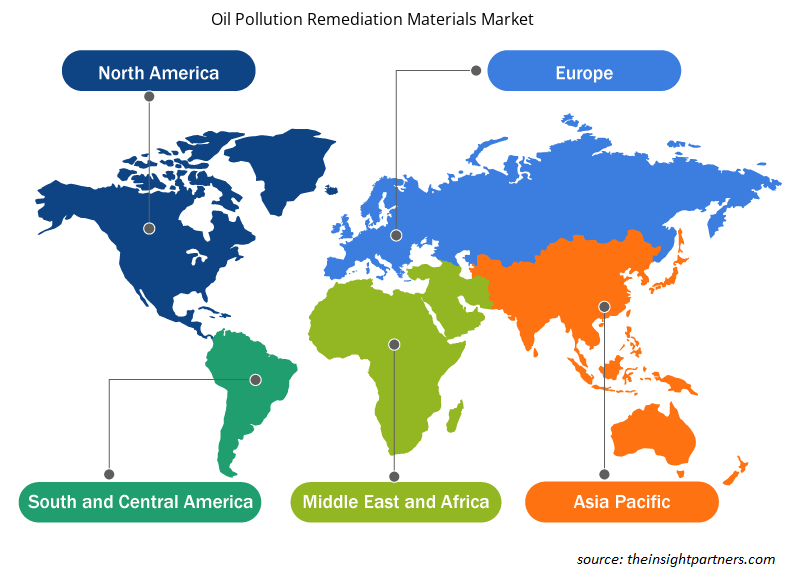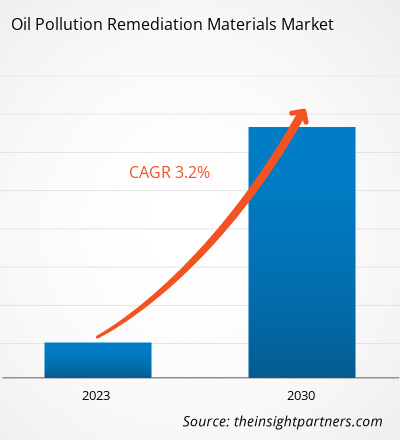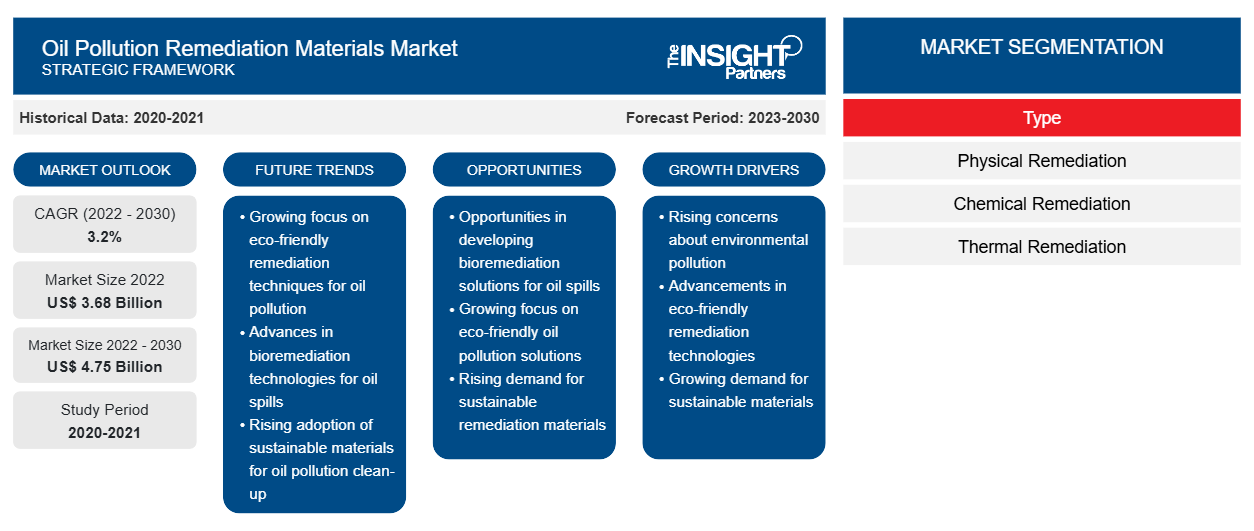[調査レポート] 油汚染修復材市場分析は、2022年に36億8,436万米ドルと評価され、2030年までに47億4,956万米ドルに達すると予想されています。2022年から2030年にかけて3.2%のCAGRを記録すると予測されています。
市場分析
油汚染修復材は、世界中で行われているさまざまな石油探査、輸送、産業活動による水域の汚染リスクを軽減するために使用されています。修復技術は、主に物理的修復、化学的修復、熱的修復、および生物的修復に分類されます。これらは、海洋油流出の問題に取り組む上で非常に重要であると考えられています。物理的修復は、ブーム、スキマー、および吸着材などの材料で構成されます。化学的修復材には、分散剤と固化剤が含まれます。
油汚染修復材市場の成長を牽引する主な要因は、沖合での石油探査と輸送活動の増加、および石油流出への備えと対応に関する政府規制です。過去数年間、さまざまな国の政府は、環境上の緊急事態に迅速かつ効果的に対応できるように、油流出の浄化規制を策定してきました。これらの規制では通常、企業が油流出を封じ込め、制御し、浄化するために従わなければならない手順、技術、および基準が概説されています。規制では、環境への影響を最小限に抑え、効果的な浄化を確実にするために使用する必要がある修復材の種類が規定されることがよくあります。効果的な油流出浄化の必要性が高まるにつれて、修復材の需要が高まっています。
環境への懸念と規制が強化されるにつれ、修復に先進的で環境に優しい材料を使用することの重要性が高まっています。特定の吸収剤、分散剤、バリアは、安全性と有効性の基準を満たすことが義務付けられる可能性があり、油流出対応活動において環境に優しく効率的な材料の使用が促進されます。政府と石油業界は、定期的な油流出対応を実施するための準備計画を立てています。油流出に迅速に対処し、生態学的影響を最小限に抑えるという政府の義務により、吸収剤、分散剤、その他の修復材料の需要が高まっています。2023年、米国環境保護庁は、連邦政府の国家緊急時対応計画(NCP)に基づき、米国の海域と隣接する海岸線での油流出対応を改善するための基準を強化しました。基準には、化学薬品や生物剤などの効果的な油流出修復製品の開発、およびこれらの製品の使用に関する透明性と情報の提供が含まれます。
沖合での探査や掘削活動の増加、パイプラインやタンカーによる石油輸送、石油の抽出や貯蔵中の人為的ミスにより、石油流出事故の可能性が高まっています。国際エネルギー機関によると、世界の石油需要は2021年に回復し、2025年までにアジアが石油需要の77%を占めると予想されています。アジアの石油輸入必要量は、2025年までに1日あたり3,100万バレルを超えると予想されています。アジア太平洋地域のさまざまな国の政府は、この地域の石油需要の高まりに対応するために石油プロジェクトを開始しています。2023年、ペトロナスとその石油協定請負業者は、19件の石油およびガス探査発見と2件の探査評価成功を報告し、マレーシアに10億バレル以上の石油換算の新規資源をもたらしました。これは、過去数年間に実施された強化された探査プログラムの結果であり、25の井戸が掘削されました。これは2015年以降、1年間に掘削された探査井の数としては最多となる。
成長の原動力と課題
米エネルギー情報局が2024年1月に発表した報告書によると、2024年1月9日現在、COVID-19パンデミック以降、原油生産量が増加しており、2年間の減少から反転している。米国の原油生産量は、2021年の1,127万バレル/日から2023年には1,321万バレル/日に増加し、2024年までに1,344万バレル/日に達すると予測されている。カナダエネルギー規制当局によると、カナダで生産される原油のほとんどは、西部の州からパイプラインを使用して米国、オンタリオ州、ケベック州の製油所に出荷されている。ブリューゲルAISBLが2023年に発表した報告書によると、ロシアは2021年に世界最大のエネルギー生産国および消費国トップ5に入った。同年、ロシアは5億9,520万トンの原油を生産し、そのうち2億8,660万トンが輸出された。したがって、沖合での石油探査と輸送活動の増加が、油汚染修復資材市場を牽引しています。
要件に合わせてレポートをカスタマイズする
このレポートの一部、国レベルの分析、Excelデータパックなど、あらゆるレポートを無料でカスタマイズできます。また、スタートアップや大学向けのお得なオファーや割引もご利用いただけます。
-
このレポートの主要な市場動向を入手してください。この無料サンプルには、市場動向から見積もりや予測に至るまでのデータ分析が含まれます。
レポートのセグメントと範囲
「世界の油汚染修復材市場予測分析」は、種類と地域というセグメントを考慮して実施されました。レポートでは、世界中の油汚染修復材の使用に関する主要な統計と、主要な地域と国での需要が示されています。さらに、レポートでは、主要な地域と国での市場パフォーマンスに影響を与える要因の定性的な評価も提供しています。また、油汚染修復材市場の主要プレーヤーと主要な戦略的展開の包括的な分析も含まれています。市場ダイナミクスの分析も含まれており、主要な推進要因、市場動向、収益の増加につながる有利な機会を特定するのに役立ちます。
エコシステム分析とポーターの 5 つの力の分析により、世界市場の 360 度のビューが提供され、サプライ チェーン全体と、油汚染修復材料市場の成長に影響を与えるさまざまな要因を理解するのに役立ちます。
セグメント分析
世界の油汚染修復材料市場は、タイプに基づいてセグメント化されています。タイプに基づいて、市場は物理的修復(ブーム、スキマー、吸着材)、化学的修復(分散剤と固化剤)、熱修復、および生物修復に分類されます。物理的修復セグメントは、最大の油汚染修復材料市場シェアを占めています。物理的修復は、水環境での油流出を制御するために一般的に使用されます。これは、水面に残っている油をその特性を変えることなく封じ込めて回収するために使用されます。また、物理的および化学的特性を変えることなく、油流出の拡散を制御するための障壁として主に使用されます。物理的修復方法を使用する最も一般的な利点は、油がその特性を保持することです。したがって、油は将来も精製して使用することができ、廃棄物を減らし、経済的損失を軽減する可能性があります。物理的修復プロセスには、ブーム、スキマー、吸着材が含まれます。
地域分析
このレポートでは、北米、ヨーロッパ、アジア太平洋 (APAC)、中東およびアフリカ (MEA)、中南米の5つの主要地域における世界の油汚染修復資材市場の詳細な概要を提供しています。中東およびアフリカ (MEA) は、世界の油汚染修復資材市場で最大のシェアを占め、2022年には15億米ドルを超えると評価されました。中東およびアフリカ (MEA) は、この地域で操業している主要な石油掘削事業の存在を示しています。アジア太平洋 (APAC) の市場は、2030年までに10億米ドルを超えると予想されています。北米の市場は、2022年から2030年にかけて約3%のCAGRを記録すると予想されています。中東およびアフリカには主要な原油埋蔵量があり、この地域では過去数年間に原油探査活動の数が著しく急増しています。石油の探査と生産活動を支援する技術の発展により、石油流出のリスクが高まり、石油汚染修復材料とサービスの需要が高まっています。したがって、技術の発展は、中東とアフリカにおける石油汚染修復材料の市場規模の拡大に貢献しています。
油汚染修復材料市場の地域別洞察
予測期間を通じて油汚染修復材市場に影響を与える地域的な傾向と要因は、Insight Partners のアナリストによって徹底的に説明されています。このセクションでは、北米、ヨーロッパ、アジア太平洋、中東、アフリカ、南米、中米にわたる油汚染修復材市場のセグメントと地理についても説明します。

- 油汚染修復材料市場の地域別データを入手
油汚染修復材料市場レポートの範囲
| レポート属性 | 詳細 |
|---|---|
| 2022年の市場規模 | 36億8千万米ドル |
| 2030年までの市場規模 | 47億5千万米ドル |
| 世界のCAGR(2022年 - 2030年) | 3.2% |
| 履歴データ | 2020-2021 |
| 予測期間 | 2023-2030 |
| 対象セグメント |
タイプ別
|
| 対象地域と国 |
北米
|
| 市場リーダーと主要企業プロフィール |
|
市場プレーヤーの密度:ビジネスダイナミクスへの影響を理解する
油汚染修復材市場は、消費者の嗜好の変化、技術の進歩、製品の利点に対する認識の高まりなどの要因により、エンドユーザーの需要が高まり、急速に成長しています。需要が高まるにつれて、企業は提供品を拡大し、消費者のニーズを満たすために革新し、新たなトレンドを活用し、市場の成長をさらに促進しています。
市場プレーヤー密度とは、特定の市場または業界内で活動している企業または会社の分布を指します。これは、特定の市場スペースに、その市場規模または総市場価値に対してどれだけの競合相手 (市場プレーヤー) が存在するかを示します。
油汚染修復材料市場で事業を展開している主要企業は次のとおりです。
- サルババイオレメッドLLC
- オイルテクニクス株式会社
免責事項:上記の企業は、特定の順序でランク付けされていません。

- 油汚染修復材料市場のトップキープレーヤーの概要を入手
競争環境と主要企業
Sarva Bio Remed LLC、Oil Technics Ltd、Ansell Ltd、Oil-Dri Corp of America、Verde Environmental Group Ltd、Ecolab Inc、Cosco Shipping Heavy Industry Co Ltd、Regenesis、TOLSA SA、およびCL Solutions LLCは、油汚染修復材市場レポートで紹介されている著名な企業の一部です。さらに、市場とそのエコシステムの全体像を把握するために、調査中に他のいくつかの企業も調査および分析されました。油汚染修復材市場レポートには、市場における競合他社/プレーヤーのパフォーマンスを評価するための企業の位置付けと集中も含まれています。
業界の発展と将来の機会
油汚染修復材市場で活動する主要企業が行っている取り組みは以下の通りです。
2022年11月、Ansell Ltdはインドのグリーンフィールド製造工場に約8,000万米ドルを投資しました。
- 過去2年間の分析、基準年、CAGRによる予測(7年間)
- PEST分析とSWOT分析
- 市場規模価値/数量 - 世界、地域、国
- 業界と競争環境
- Excel データセット
最新レポート
関連レポート
お客様の声
購入理由
- 情報に基づいた意思決定
- 市場動向の理解
- 競合分析
- 顧客インサイト
- 市場予測
- リスク軽減
- 戦略計画
- 投資の正当性
- 新興市場の特定
- マーケティング戦略の強化
- 業務効率の向上
- 規制動向への対応























 無料サンプルを入手 - 油汚染修復材料市場
無料サンプルを入手 - 油汚染修復材料市場